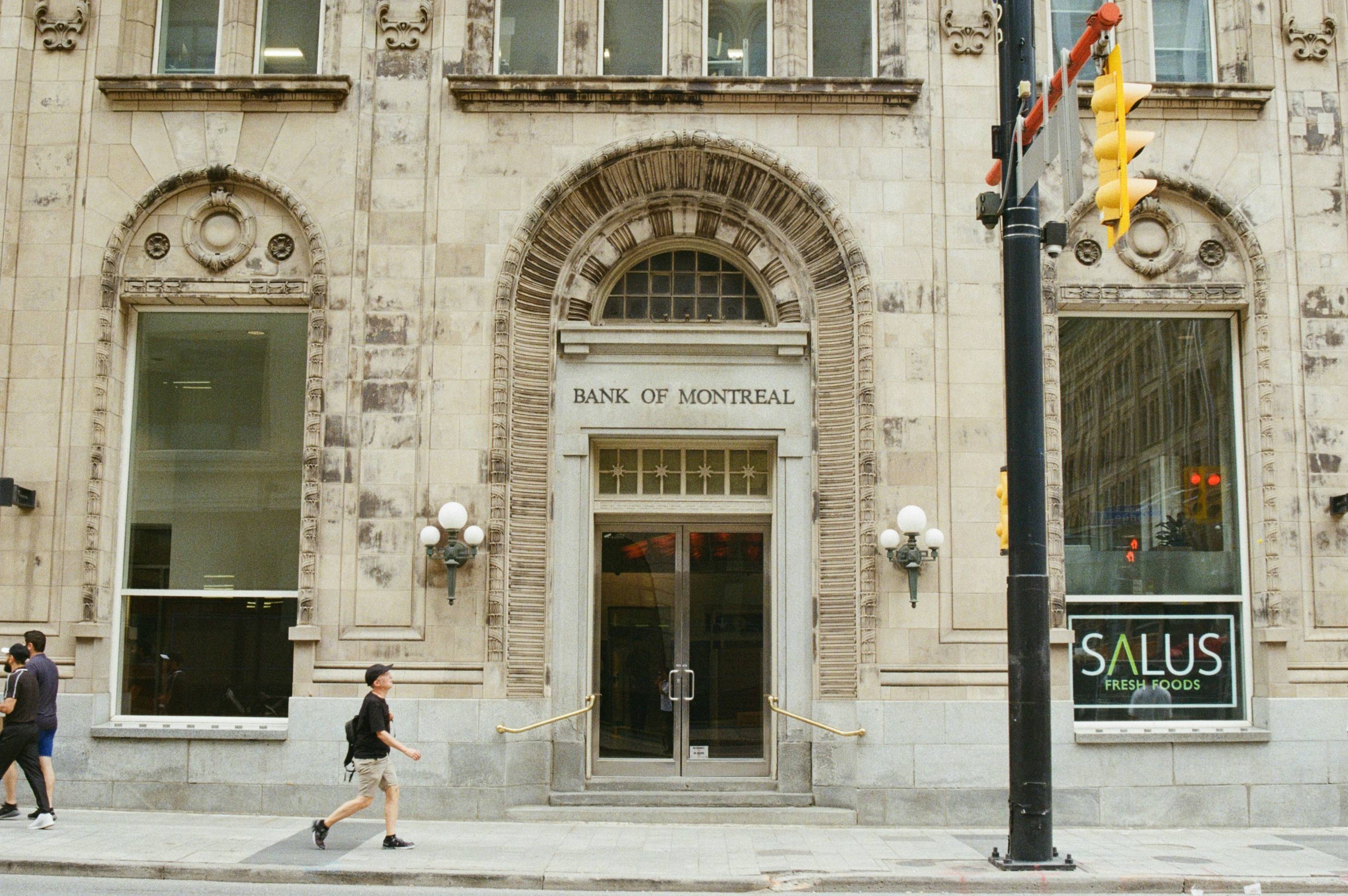Canadian banks in Ireland have a longer heritage than many might realise, although ties between the two countries have strengthened over recent years. In the wake of the UK’s decision to leave the European Union in 2016, some Canadian financial services providers sought out a new home within the EU and turned to Ireland. In fact, one of Canada’s traditional ‘big five’ banks has had a presence in Ireland dating back almost 60 years, to 1966.
Canadian banks that moved operations to Ireland following Brexit have since grown their headcount by more than 50%, and have set up multiple functions from their Irish bases, ranging from technology, capital markets, and corporate banking to environmental, social and governance (ESG) and research and development.Financial services companies from Canada have been some of the most active in the Irish market over the past decade, and now four of the top six Canadian banks have a presence in Ireland: Bank of Montreal (BMO), National Bank of Canada, Scotiabank, and Toronto Dominion.
They’re part of a broader wave of Canadian companies that are seeing the benefits of setting up operations in Ireland. In 2018, there were 38 Canadian-headquartered companies supported by IDA Ireland, the Government’s investment promotion agency. At the time, those firms employed close to 4,000 people. Within six years, that had risen to 57 companies with more than 7,000 employees.
 Reasons to set up in Ireland
Reasons to set up in Ireland
This rapid growth has multiple reasons behind it, as Nicola Vavasour, CEO of Scotiabank Ireland, explains. “There is access to quality talent across multiple disciplines, it’s a business-friendly environment, and there is strong cultural alignment between Canada and Ireland. We see that in our daily interactions with colleagues in Canada,” she says.Scotiabank is the longest standing representative bank in Ireland, having first set up a branch in Dublin in 1966 which later became a subsidiary. Scotiabank Ireland is now the bank’s primary relationship manager for all clients in the European Economic Area (EEA), leveraging its global operating model. Its EU business includes Capital Markets (fixed Income Sales & Trading, Debt Capital Markets and Equities) and Corporate Banking services.
Since then, the Irish operation’s balance sheet has tripled, says Nicola Vavasour. “We have seen increased client numbers which has led to significant growth in our revenue. Our headcount in Dublin has gone from 50 people in 2018 to more than 110 now, and continues to grow: not just in numbers but seniority,” she says.
Ireland’s place as a European hub
Similarly, Bank of Montreal (BMO) restructured its operations after Brexit and in 2019 chose its existing Irish unit to be its European hub for continued regulated markets business activities throughout the EEA. The Canadian group’s fully-licensed Bank of Montreal Ireland (BMI) subsidiary became its only EU-based entity, which gave the group passporting rights across the EEA, along with the ability to access European Central Bank funding. Headcount at the Dublin office is close to 80 people, and the main activities there include sales and trading treasury, operations, debt capital markets, and risk, compliance and anti-money laundering.NBC Global Finance is a subsidiary of National Bank of Canada, which set up in 2013 in Dublin. The MIFID firm acts as the European hub for securities finance for NBC Group. NBCGF is a key partner for international wholesale financial services firms.
Ireland’s success in attracting inward investment means that companies choosing to invest in ireland benefit from the cross-pollination of talent between sectors. Today, 13 of the top 20 global technology companies and eight of the top 10 US software companies have a European headquarters or significant presence in Ireland. Given the growing trend towards technology adoption among financial services players, that’s an advantage for firms looking to augment their teams.
 A broad base of financial services skills
A broad base of financial services skills
Such is the depth of talent in cybersecurity, for example, that the US financial services firm State Street and JRI America, the IT services provider for Sumitomo Mitsui Banking Corporation, have set up teams based in different parts of Ireland providing group-wide cybersecurity services for their businesses.
“On the technology side, you have an opportunity to pull from a deep and rich base of graduate talent – both Irish and non-Irish,” he says. Although the firm’s business model is focused on capital markets rather than consumer-facing fintech, he adds: “We have been looking at areas within our own business and the technology-heavy trading side of our operating models and how we can launch them in Ireland, using the supports available through IDA Ireland.”TD Securities Ireland CEO Enda Kilcullen describes Ireland’s technology-financial services ecosystem as “a good petri dish for experimental technology”.
Scotiabank’s Nicola Vavasour adds: “We’re certainly aware of the strong talent pool that exists in Ireland from a technology standpoint, and may in time look to leverage this further.”

Scaling successfully through talent
Like Scotiabank, TD Securities has had a presence in Ireland for more than 30 years, but its operation in Dublin has accelerated rapidly in the past decade in particular. From a small base in 2016, it now employs 230 people, having added 20 additional roles in the first quarter of 2025. Among the functions at the EU hub are global equities and derivatives, foreign exchange, commodities, debt capital markets, as well as front office functions such as trading and sales for European clients.TD Securities confirms that availability of talent has been a key factor in being able to scale successfully in Ireland.
Recently, TD Securities has been tapping into graduate programmes as it continues to build out its team. “The quality and diversity of talent that we see coming through the Irish university system is impressive. Already we have mobilised some into global roles which is ultimately what we would look to do on the technology side, with a focus on IT engineering, cybersecurity and regulatory tech. On the markets side, we see some good organic talent on the Irish side of things and we have been able to attract talent back into Ireland,” he adds.“Around the finance, risk and compliance regulatory space, the calibre of talent we’ve been able to attract is exceptionally high,” Kilcullen says.
Scotiabank has successfully drawn on its internal resources to fill certain roles, and Ireland has proved to be a place where people are happy to live and work. “We have people returning to Ireland from the USA, Canada or the UK, or people seeing Ireland as a great opportunity for career progression, so we have been successful in attracting people across the Scotiabank footprint to Ireland,” says Nicola Vavasour.

Support in setting up and scaling
Another critical factor in choosing Ireland to set up or expand is the “tangible and intangible” support of IDA Ireland, Enda Kilcullen adds. TD Securities has been working with IDA Ireland over the past two years on obtaining grant support for research and development into exploratory new business areas, with one project approved and a second in progress.This assistance from IDA Ireland extends beyond just financial support and helping companies to become established in Ireland. From connecting client companies to the university system when recruiting, or making introductions to peer companies, the help takes many forms.
“Ireland and the IDA offer a more rounded model that puts a lot of emphasis on cross-connectivity and the ability to open doors and networks. The success of what we see around us in Ireland is tantamount to that process. It’s a very effective model for us to be able to lean into. I would say that there’s probably no request that’s too challenging. They always offer to help and support,” Kilcullen says.
It’s a relationship based on continual dialogue to make sure companies operating in Ireland have everything they need to grow and thrive. One of the key points in IDA Ireland’s latest strategy is to help its client companies to be resilient against market uncertainty and sustainable into the future. It’s an opportunity that Canadian banks can grasp. As Scotiabank’s Nicola Vavasour says: “Notwithstanding current market conditions, certainly we see continued opportunities in Ireland as we move forward.”
